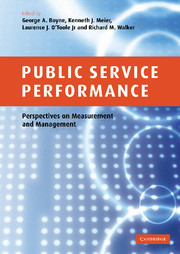Book contents
- Frontmatter
- Contents
- List of figures
- List of tables
- Notes on contributors
- 1 Introduction
- 2 Subjective and objective measures of organizational performance: An empirical exploration
- 3 All measures of performance are subjective: More evidence on US federal agencies
- 4 A qualitative evaluation of public sector organizations: Assessing organizational performance in healthcare
- 5 Quantitative approaches towards assessing organizational performance
- 6 Consequences of goal ambiguity in public organizations
- 7 Performance control and public organizations
- 8 Bureaucratic red tape and organizational performance: Testing the moderating role of culture and political support
- 9 All that glitters is not gold: Disaggregating networks and the impact on performance
- 10 Network evolution and performance under public contracting for mental health services
- 11 The design and management of performance-based contracts for public welfare services
- 12 Outsourcing government information technology services: An Australian case study
- 13 International comparisons of output and productivity in public service provision: A review
- 14 Public management and government performance: An international review
- 15 What drives global e-government? An exploratory assessment of existing e-government performance measures
- 16 Public management and organizational performance: An agenda for research
- Index
- References
16 - Public management and organizational performance: An agenda for research
Published online by Cambridge University Press: 22 September 2009
- Frontmatter
- Contents
- List of figures
- List of tables
- Notes on contributors
- 1 Introduction
- 2 Subjective and objective measures of organizational performance: An empirical exploration
- 3 All measures of performance are subjective: More evidence on US federal agencies
- 4 A qualitative evaluation of public sector organizations: Assessing organizational performance in healthcare
- 5 Quantitative approaches towards assessing organizational performance
- 6 Consequences of goal ambiguity in public organizations
- 7 Performance control and public organizations
- 8 Bureaucratic red tape and organizational performance: Testing the moderating role of culture and political support
- 9 All that glitters is not gold: Disaggregating networks and the impact on performance
- 10 Network evolution and performance under public contracting for mental health services
- 11 The design and management of performance-based contracts for public welfare services
- 12 Outsourcing government information technology services: An Australian case study
- 13 International comparisons of output and productivity in public service provision: A review
- 14 Public management and government performance: An international review
- 15 What drives global e-government? An exploratory assessment of existing e-government performance measures
- 16 Public management and organizational performance: An agenda for research
- Index
- References
Summary
Introduction
How can public services performance be improved? This question is central to both governmental reform efforts and the academic study of public management. If one leaves aside the possibility of pure dumb luck, effective policy and managerial prescriptions must be built upon a grounding of information – in particular, valid knowledge regarding the correlates of performance. This key step is necessary to both identify variables which can be adjusted to beneficial effect and provide input for policy makers' deliberations.
The work in this volume constitutes a systematic effort focused on three key questions entailed by such an objective. First, what are the appropriate ways to measure a public organization's performance? Second, what role does management play in enhancing – or, for that matter, inhibiting – performance? Third, how does the context of programmes and organizations, both political and organizational, create contingencies that enhance or suppress the various determinants of performance? The early parts of the book are organized around the first pair of these questions. The international comparisons sketched in the last part of the volume contribute directly to the third point, but most of the chapters also touch upon it.
Much credible work has been reported by the authors represented here and numerous insights regarding all three questions can be garnered from the foregoing contributions. Still, in this effort as with all dynamic research programmes, new questions arise as old ones are put to bed.
- Type
- Chapter
- Information
- Public Service PerformancePerspectives on Measurement and Management, pp. 295 - 311Publisher: Cambridge University PressPrint publication year: 2006
References
- 10
- Cited by



